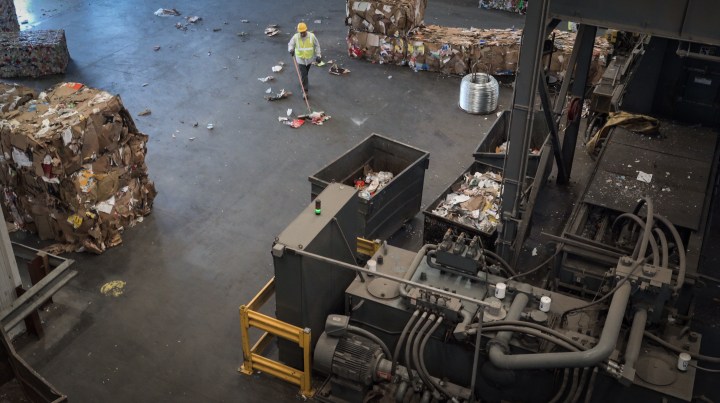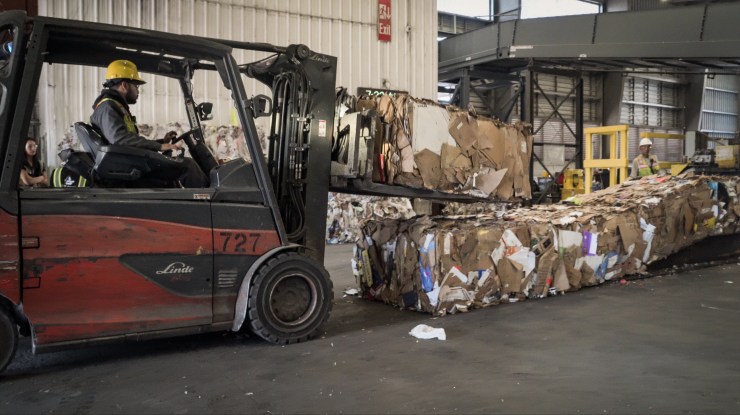
How companies commodify your recycled waste

In Sun Valley, California, a neighborhood north of Los Angeles, around 250 trucks per day dump onto a concrete floor 1,000 tons of cardboard, plastic, aluminum and anything else people have thrown into blue recycling bins.
“[We] select all the good stuff and recycle it back into the marketplace,” said Riel Johnson, vice president of resource recovery for Athens Services, a Southern California-based waste collection and recycling company. “We’re taking material that was a waste and upgrading it to a commodity.”
Americans generate almost 300 million tons of solid waste per year, according to an Environmental Protection Agency estimate. In 2018, the most recent year of data available, roughly 23% of that waste was recycled or composted.
Athens Services, one the largest recycling companies in Southern California, has contracts with cities and companies to haul recyclables away. It’s the first step in a long process that turns consumers’ waste into a new commodity.
“Marketplace” host Kai Ryssdal toured Athens Services’ Materials Recovery Facility with Johnson and Johnnie Stevenson, the facilities’ general manager. The following is an edited transcript of their conversation.
Kai Ryssdal: When you look at our waste stream, how are we doing?
Riel Johnson: That’s a tough one because things have changed. Economics have changed, especially international political policies with China and other folks. So, you know, I’d say we’re doing OK. Technology is helping us; it’s making it safer. This is a very dangerous business, the seventh most dangerous industry in the country — so technology is helping get hands out of the way.
Ryssdal: Talk to me for a second about China. I did a bunch of interviews four, five years ago, as China was saying, “We don’t want American waste anymore, we don’t want your recyclables.” How big a challenge was that for you? Because that was a big deal.
Johnson: Oh that was huge. It was huge, somewhat self-inflicted, I think.
Ryssdal: Self-inflicted? Sorry, it’s very loud in here.
Johnson: Somewhat self-inflicted. We were selling some pretty undesirable material over that way, and it came back and got us. So now we have to step up our efforts. We need to make a higher quality product, and so that’s what we’re doing.
Ryssdal: Take me down and show me that autonomous AI thing because that’s, frankly, a little scary-looking. I’ll follow you.
Johnnie Stevenson: So this is Max-AI. There is a light source that looks at the material, and as it comes across, you’ll see that it’s suctioning up those —
Ryssdal: Oh man, that’s so amazing. So first of all, it’s a lot of plastic coming through here. And [the machine] is letting all the plastic bottles go through, but then a big chunk of Styrofoam came through — and look, even I know Styrofoam is not recyclable — and it picked it up and said, “No, you’re outta here.”
Stevenson: It recognizes it [and says], “I remember you. You should not be here.”
Ryssdal: That’s crazy. How much does this machine cost?
Johnson: I’m not going to tell you.
Ryssdal: Is it $100,000?
Johnson: It’s more than that, it’s more than that. But it’s taking the place of two humans. Humans are fairly expensive … and the interesting thing about robots is that they pick consistently.

Ryssdal: Where’s Johnny? Can you hire enough people? Is labor an issue for you right now?
Stevenson: Labor’s challenging. Especially in the more skilled positions, like heavy equipment operators … those are challenging to find right.
Ryssdal: OK, wait — I was watching this woman earlier and I was trying to figure out the rhyme or reason of what she was doing. And there was a bunch of green laundry detergent bottles that went in one of these things, and then there were a bunch of red laundry detergent bottles that went in a different container, and I was like, “Oh, OK, [she’s] sorting by color.” But then she took a green one and put it in the red bin.
Stevenson: So, they’re not necessarily separating by color, they’re separating by the plastic type.
Ryssdal: So, she has to know on a like a five-second look, maybe a three-second look, what kind of plastic it is?
Stevenson: Exactly. Yes.
Johnson: I was gonna say, this is just what artificial intelligence does. So, just like this person has targets and landmarks and she’s making a decision, AI does the exact same thing.
Ryssdal: All right, let’s to the the bottom …
Johnson and Stevenson walked Ryssdal down some metal stairs and into an open area with forklifts zipping around. There was a machine pressing cardboard into cubes so that it could be sold and shipped abroad.

Ryssdal: OK, so we’re downstairs, we’ve got bales of everything, we’ve got cardboard coming out of the baler, we’ve got a zillion tin cans crushed into a cube over there. How much does one of these bales weigh?
Stevenson: Somewhere about 1,500 pounds. When they leave here, they’re going to go to the port. They’ll sit there, wait for the next ship, and that’s going to send it to the next end-user.
Ryssdal: Does it ever occur to you guys that you’re doing this year, and in a year and a half, maybe two years — fundamentally the same fiber, the paper fiber is going to be coming through this plant again, you can see that chunk of aluminum coming through.
Johnson: Yep. It’s really cool.
Ryssdal: So here’s the ender. Are you ready? Is this enough?
Johnson: Enough for what?
Ryssdal: Enough to take care of everything that we’re producing on this planet? Without busting the planet at the seams? We need a zillion of these factories.
Johnson: And it all depends on economics, right? We experience when the economy — especially the global economy — starts to sag. People aren’t buying TVs. When they don’t buy TVs, they don’t need a box. [If] they don’t need a box, they don’t buy as much cardboard, [and] the value of the cardboard falls.
Ryssdal: I should have asked this question earlier — I’m not saying one way or the other whether we’re in a recession or going to have a recession, other people are going to figure that out — but you can see it coming through here? You can see a recession, you can see a slowdown.
Johnson: I would say our business is recession-resistant but not recession-proof. We notice a change on the inbound because people’s purchasing changes. We notice the changes on the outbound because commodity values fluctuate. Going back to what I said before, if there’s a huge market for recyclable goods, it’ll drive these things forward and more people will want or need to get into it.
There’s a lot happening in the world. Through it all, Marketplace is here for you.
You rely on Marketplace to break down the world’s events and tell you how it affects you in a fact-based, approachable way. We rely on your financial support to keep making that possible.
Your donation today powers the independent journalism that you rely on. For just $5/month, you can help sustain Marketplace so we can keep reporting on the things that matter to you.

















